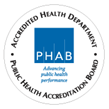Health Department
Quick Links
About the Kent County Health Department
Mission: To serve, protect and promote a healthy community for all.

The Kent County Health Department is responsible for continually assessing the health of the community and ensuring that certain services are available and accessible for its citizens. To this end, the Health Department investigates the causes of disease, epidemics, morbidity and mortality, and environmental health hazards using vital and health statistics for epidemiological studies. KCHD also plans and implements public education and enforces public health laws.
The Health Department is responsible for assuring the provision of certain core programs in the following areas: vision and hearing screening, public water supplies, private and Type II groundwater supplies, food service sanitation, immunization, sexually transmitted diseases, on-site sewage disposal management, and general communicable disease control. KCHD offers several other services beyond these core programs.
The Health Department operates four public health clinics throughout the county that offer immunizations and the Women, Infants, and Children program (WIC). These programs prevent disease and ensure adequate nutrition for moms and babies from pregnancy to childhood. KCHD also operates a tuberculosis (TB) and Personal Health Services (PHS) clinic. Through testing and direct observed therapy, the TB clinic aggressively treats cases of TB to eradicate the disease from Kent County. PHS offers testing, counseling, and in some cases, treatment, of HIV, gonorrhea, syphilis, and Chlamydia. As part of its work, the Communicable Disease and Epidemiology units of KCHD work with local health care providers to track disease, investigate outbreaks, and report County-wide case numbers for these diseases and approximately 75 other illnesses ranging from influenza to salmonella.
While the clinic and lab settings are a big part of public health, much of the Health Department's work takes place in the field. Public health nurses and caseworkers make thousands of home visits each year, teaching parenting skills, inspecting homes that have contributed to lead poisoning in children, and supporting parents who are grieving the loss of a child. Sanitarians inspect restaurants, swimming pools, adult care facilities, well and septic supplies, and more. Nurses make home visits to ensure that TB patients are completing their treatment regiments. PHS staff take HIV testing into the community to target high-risk populations. Health Education and Promotion staff bring important lessons to classrooms, places of worship, the workplace, and elsewhere. Education topics range from dog bite prevention to hand-washing to safe dating.
Public Health Officials
Health Department Administrators
- Administrative Health Officer: Adam London, PhD, RS, DAAS
- Deputy Administrative Health Officer: Karla Black, PhD
- Deputy Administrative Health Officer: Gail Brink, C.P.A.
- Medical Director: Nirali Bora, MD
- Center for Community Health Strategy Division Director: Brian Hartl, MPH
- Community Clinical Services Division Director: Christopher M. Bendekgey B.S., M.S.
- Community Wellness Division Director: Joann Hoganson, R.N., M.S.N.
- Environmental Health Division Director: Sara Simmonds, MPA, REHS


